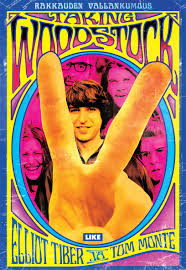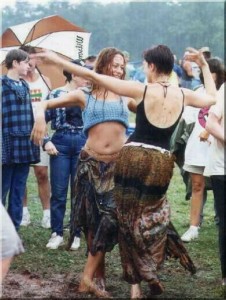 Taking Woodstock
Taking Woodstock
by Elliot Tiber with Tom Monte
Square One Publishers
215 pages, $24.95
AT ONE POINT in the “true story” of the early years of his life, Elliot Tiber describes meeting Marlon Brando and Wally Cox in the San Remo bar in Greenwich Village. Although this encounter took place over forty years ago, Tiber reproduces, in improbable detail, the conversation of the three men. The recent college graduate is so successful in holding up his end of the witty exchanges that “Mr. Peepers” and “Stanley Kowalski” invite him to come with them to a party. “And it was one of the best nights of my life,” reports Tiber. This comment is fairly typical of the depth of insight offered by Taking Woodstock, a book which demonstrates the pitfalls of writing about famous people and events.
Tiber was born Eliyahu Teichberg, the son of Russian Jewish immigrants who lived in the Bensonhurst section of Brooklyn. All of us have a good story to tell about our childhood. For the young Elli, it is a tale of an avaricious mother who is a terrible cook, a henpecked father who works constantly, and a poor boy socially isolated among rich kids at a yeshiva (Jewish day school). Tiber recalls all this with an unappealing amount of sarcasm, most of it directed at his mother. One exception is a touching description of father and son working together patching roofs. Like many boys of that era, Elli longed for his distant father’s love but received instead only whippings from his belt when he misbehaved. “The Teichberg Curse,” a reference to his parents’ inability to make money, is the title Tiber gives to the chapter on his childhood, but the experiences here seem more genuine and deeply felt than many of the others in the book because they are his own, not shared with the celebrities who drop in and out of his life. The name-dropping begins when the seventeen-year-old Elli enrolls in Brooklyn College to study art. One of his teachers is Mark Rothko, who befriends him. At this point, the reader expects an appreciation of Rothko’s art, or at least some good stories about the great painter before he became famous. Instead, we get: “It was obvious that the man was a genius. And, in truth, I was honored to be in his company.” The reader’s expectations are similarly disappointed when Tiber goes home for a night of S&M sex with Robert Mapplethorpe, or when he encounters a naked and passed-out Rock Hudson at a party, or when he moves into the apartment building where Tennessee Williams lives. Williams, by the way, introduces him to Truman Capote (“I absolutely loved his writing, as well as his unique personality”). Having partied with the famous is not the same thing as having something interesting to say about them. When he begins to tell the story of his role in the Woodstock concert, Elliot Tiber acknowledges that people like Rothko, Williams, and Capote “were in another universe,” inhabiting a world he couldn’t understand or share. But in 1969 he did take part in two historic events, the first Stonewall Riot and Woodstock, the rock festival, and the premise of his book is that these events changed his life. Tiber was in the Stonewall Inn during the early morning of June 28, 1969, and he devotes five pages to describing what he saw and did. To say there is nothing new or particularly discerning in his account is not to diminish its authenticity. The bulk of Taking Woodstock is devoted to the preparations for the concert that took place on Max Yasgur’s farm in Bethel, New York, from August 15 to 18, 1969. Tiber held the permit that made the concert possible. When the original venue canceled, he arranged a meeting between Michael Lang and the other concert organizers and Max Yasgur. He and his parents were also operating the El Monaco, a decrepit motel in Bethel, which for a month served as the headquarters for the concert organizers. Tiber has quite a story to tell, mostly about battles with the town council, the logistical challenges of housing and feeding thousands of people, traffic jams, and, yes, naked bodies, drugs, and sex—but not about the concert itself, which he did not attend. In the midst of the chaos, Tiber is outed to his parents and finds the love he always wanted from his now ill father. Tiber is the hero of every incident, which comes to seem a bit vainglorious, and his method of writing is more appropriate to a work of fiction than a memoir. He presents dialogue and descriptive details no one would be likely to remember 38 years later: surely Tiber has embellished these memories. And the in-the-moment quality of the writing lets him off the hook when it comes to offering reflections on the enduring significance of Woodstock other than in personal terms. Tiber concludes with the mantra that Woodstock validated the “freedom to be oneself and to give and receive love,” and ends with a brief summary of his life since the concert. The absence of solid historical or cultural perspective, like the simplistic name-dropping earlier in the book, will limit the value of Taking Woodstock for many readers. This is a book written (with a little help from Tom Monte) by a man who has some good stories to tell but is essentially not a writer, at least not one who can effectively communicate to the reader the larger significance of his brush with history. Daniel Burr is an assistant dean at the Univ. of Cincinnati College of Medicine, where he teaches courses on literature and medicine.





